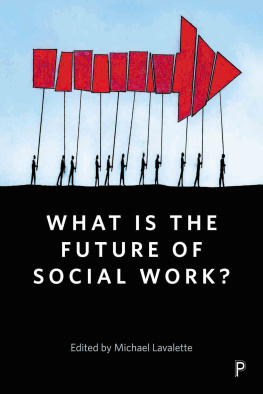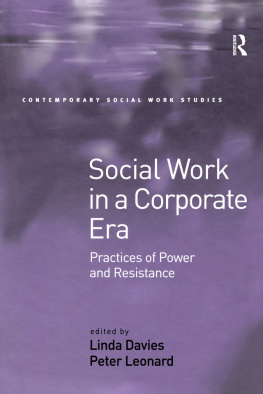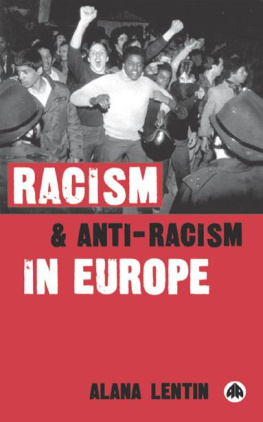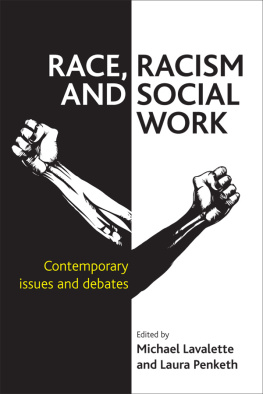To the memory of Stephen Lawrence
Anti-Racism and Social
Welfare
Edited by
MICHAEL LAVALETTE
LAURA PENKETH
CHRIS JONES
First published 1998 by Ashgate Publishing
Reissued 2018 by Routledge
2 Park Square, Milton Park, Abingdon, Oxon, OX14 4RN
711 Third Avenue, NewYork, NYI0017, USA
Routledge is an imprint of the Taylor & Francis Group, an informa business
Copyright M. Lavalette, L. Penketh and C. Jones 1998
All rights reserved. No part of this book may be reprinted or reproduced or utilised in any form or by any electronic, mechanical, or other means, now known or hereafter invented, including photocopying and recording, or in any information storage or retrieval system, without permission in writing from the publishers.
Notice:
Product or corporate names may be trademarks or registered trademarks, and are used only for identification and explanation without intent to infringe.
Publishers Note
The publisher has gone to great lengths to ensure the quality of this reprint but points out that some imperfections in the original copies may be apparent.
Disclaimer
The publisher has made every effort to trace copyright holders and welcomes correspondence from those they have been unable to contact.
A Library of Congress record exists under LC control number: 98073763
ISBN 13: 978-1-138-61024-8 (hbk)
ISBN 13: 978-0-429-45980-1 (ebk)
Paula Asgill is a Senior Lecturer in the Department of Applied Social Sciences, University College of St. Martin, Lancaster.
Gideon Ben-Tovim is a Reader in Sociology at the University of Liverpool.
Claudia Bernard is Lecturer in Social Work at Goldsmiths College, University of London.
Manneh Brown is honorary fellow, Department of Sociology, University of Liverpool.
Dr Dee Cook is Associate Dean of Research at the University of Wolverhampton.
Simon Dyson is Principle Lecturer in the Department of Health and Continuing Professional Studies, De Montfort University, Leicester.
Jennie Fleming works within the Centre for Social Action at De Montfort University.
Cheryl Gore works in the Department of Education, University of Birmingham.
Mark Harrison is the Director of the Centre for Social Action, De Montfort University.
Karen Hassell works in the Pharmacy section at the University of Manchester.
Chris Jones works in the Department of Sociology, Social Policy and Social Work Studies, University of Liverpool.
Paul Kyprianou is honorary fellow, Department of Sociology, University of Liverpool.
Michael Lavalette works in the Department of Sociology, Social Policy and Social Work Studies, University of Liverpool.
Ian Law is Senior Lecturer and Director of the Race and Public Policy Research Unit, School of Sociology and Social Policy, University of Leeds.
Margaret Ledwith is Senior Lecturer in Community and Youth Studies, University College of St. Martin, Lancaster.
Laura Penketh works in the Social Policy section of the Department of Social Studies at the University of Central Lancashire.
Barney Rooney is honorary fellow, Department of Sociology, University of Liverpool.
Rhonda Wattley works within the Centre for Social Action at De Montfort University.
We would like to thank each of the contributors for their work and patience in seeing this project through to completion. Ashgate have allowed us to be flexible with our deadlines and have been helpful with our many queries. In particular we would like to record our thanks to Karen McGowan who prepared the script to camera ready standard (and did so while dealing with the demands of a new born baby, Heather).
Michael Lavalette
Laura Penketh
Chris Jones
Dedication
While working on this book the murder of Stephen Lawrence by a group of white racists has been a recurrent item in the national media. The scandal of Stephens death is not only that such lynchings continue to take place in Britain in the 1990s but that the police and authorities refused to act when informed who the culprits were and whose initial investigations were framed around the idea that Stephen, because he was black, must have been guilty of something. If there was ever a series of events which confirmed the structurally and institutionally racist nature of British society then perhaps this is it. As part of the campaign for justice we dedicate this book to the memory of Stephen Lawrence.
Michael Lavalette
The chapters gathered here are developed from papers originally presented to a one day conference on Racism and Social Welfare at the University of Central Lancashire in April 1996. The conference was well attended with 60 papers presented to over 120 participants. The size of the conference reflected the continuing concern with issues of race and anti-racism in the field of social welfare and was helped by the support provided by the Department of Social Studies at Central Lancashire and the Social Policy Association.
In the 1990s racism continues to blight the lives of Black people in Britain. Britains Black population continue to suffer disproportionately in terms of poverty, unemployment, ill-health, poor housing and inferior working conditions. Racist violence, police harassment and criminalisation remain part of the experience of Black youth. Both overt and covert forms of institutionalised racism relegate or ignore the needs of minority ethnic groups within the full range of social welfare services. While the consequences of the racialisation of political and social life has meant that the Black presence continues to be viewed as a problem for many in authority. The reality is that racist oppression, built into the very fabric of modern capitalist society, affects the Black community on a daily basis. The conference reflected the continuing concern that such structured inequality remains part of the functioning of the British welfare state and that research agendas and praxis which are shaped by anti-racist concerns continue to be marginalised by the political establishment, within welfare services and often within Higher Education establishments: practically orientated research agendas are increasingly marginalised by the restrictions of the Research Assessment Exercise which increasingly blights academic research activity.
Yet the reality and consequences of racism are well established. They have been recognised within academic discourse over the last twenty years at least and during this period, policy makers and welfare professionals, have apparently taken cognisance of racism, its causes and consequences. As we approach the new millennium an assessment of the successes and failures of race equality and anti-racist strategies is necessary: how have they improved the lives of Black welfare workers and welfare recipients? Most of the papers, while emphasising the continuing blight of racism, also try to offer an evaluation of various anti-discriminatory policies, locating problems and opening up debate about possible future developments.











